Once, buyers were overwhelmed with choice. Now, they’re just overwhelmed with a choice of tools to help them choose. But gdgt, one such site, is hoping that it can build the ultimate solution for consumers looking to make smart gadget buying solutions, is launching new custom search tools it hopes will make using it to clear up shopper confusion a no-brainer.
Gdgt is the brainchild of former Engadget founder Peter Rojas and former editor-in-chief of the same site Ryan Block, offering users a huge database of products to rate, review, compare and declare both their ownership of and desire for. For the gadget space, which is pretty strongly rooted in conspicuous consumption, it is a mecca. You can search for search for virtually anything that runs on electricity and get a look at how it’s been reviewed around the web by professionals, and what other users think. Lately, the team behind it has been quietly and steadily adding new features to make it even better at its job.
“We look at everything holistically when we make an evaluation of a product,” Block told me in an interview, explaining that a lot of what gdgt is has to do with what the founding team saw at Engadget. “We kind of sat down and we took a look at what was wrong with the consumer electronics buying experience online, and we came up with this idea that was somewhat akin to Rotten Tomatoes for personal technology, and that is that we wanted to look at everything there was to know about a product and come up with a very simple, easy-to-digest assessment.”
The new gdgt is all about providing a clear ranking methodology to help users get an at-a-glance look at what they should be buying in any given category. All devices get a score, which is built from a variety of different source data, including reviews at tech sites including this one, user reviews, and first-hand research and testing from the gdgt staff themselves. Categories each get Must Haves taken from the highest scoring gadgets (no more than three per) to help make sure that there’s very little digging to do to come up with the best devices overall.
Gdgt’s latest addition is the redesigned ‘Finder’ (the one for cameras is here, but it’s active for all popular product categories and should be available across the site within the week), which uses simple sliders for important factors like price range and screen size, as well as a couple other simple check box filters to instantly narrow the pool of available products. That process is manually tailored for each individual product category, meaning you’ll never have to wade through unnecessary or irrelevant criteria, and Block is keen to note that gdgt also never scrapes its data, instead using a team of editors and curators to manually prune its results so that you won’t run into the sort of screw-ups typical when you hand these kinds of duties over to a robot.
The people-driven approach also means that gdgt can apply a rubric to reviews from sites that don’t necessarily quantify reviews with a firm number score, and still incorporate that input into its recommendations, something a site that scrapes can’t achieve. That leads to the inclusion of high-quality sources, like the New York Times, which otherwise might go overlooked at sites that depend more on strictly data-driven models like Decide.com and Snapsort.
It hasn’t happened overnight, but gdgt’s approach to the world of consumer tech now puts it in the same basic space as something like The Wirecutter, looking to find a better way to help consumers shop. Block notes however that the approach taken by former Gizmodo editor Brian Lam leans even more heavily toward the editorial side of things and away from data-driven techniques, and he sees the two sites as complimentary, not competitive.
The new focused identity of gdgt as an aide for consumers looking for the best way to spend should help the site with its affiliate revenue from retailers, and overall the site’s reputation and growing library of gadget-related knowledge help it with its growing event-driven business. Overall, gdgt has tied its fortunes to the appetites of early adopters and the rapidly growing community of tech consumers, so if it can continue figuring out ways to continue better serving that community, it should be in a very good place.
